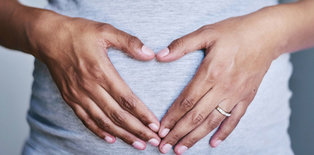Sleep Apnea and Pregnancy: Causes, Signs and Treatment

Getting a good night's sleep is important for everyone, and even more so for people who are pregnant. But sleep apnea is a potentially dangerous condition that can interfere with getting the rest you need, and pregnancy can increase the risk of developing sleep apnea.
What is sleep apnea?
Obstructive sleep apnea (OSA) is a disorder of abnormal breathing that occurs during sleep. The upper airways are unable to maintain their tone during sleep, resulting in the collapse of the breathing tubes. This collapse then leads to drops in blood oxygen levels and sleep fragmentation or interruption. Patients that have OSA usually snore loudly and may have non-refreshing sleep or feel sleepy and tired during the day.
Sleep apnea has been associated with significant medical disorders, such as hypertension, diabetes, heart problems and stroke, as well as depression. It also has been associated with car crashes and difficulty concentrating.
What causes sleep apnea?
Sleep apnea results from the collapse of the airways during sleep. This collapse may be related to excess fat in the body, the anatomy of the neck and face, or even excess fluid in the body. Individuals with obesity are at risk for OSA, but OSA can occur in lean individuals as well.
Sleep apnea during pregnancy
The risk for OSA increases in pregnancy because of many factors that occur normally during pregnancy. OSA is most common in pregnant women with an elevated body mass index, but women with a history of gestational diabetes or pregnancy hypertension are also at risk.
Sleep apnea in pregnancy has been associated with increased risk for preeclampsia, an increased risk for gestational diabetes, and an increased risk for severe complications, even after taking into account other risk factors such as obesity.
How is sleep apnea diagnosed?
Sleep apnea is suspected when individuals have loud frequent snoring, daytime sleepiness, or have some physical features that suggest the diagnosis. However, in order to make the diagnosis, a sleep study will need to be performed. The sleep study can be performed in the home environment where a patient takes a device home with them and then applies it at bedtime and uses it during sleep. In some circumstances, a sleep study that is done at a sleep center is required. This means that the patient would have to sleep at the sleep center. The study ends in the early hours of the morning and patients can usually go to work on that morning.
Does pregnancy sleep apnea go away?
Sleep apnea may get better after pregnancy but it is difficult to predict whose sleep apnea will improve after delivery. Research to this date shows that sleep apnea goes away in about half of the women diagnosed during pregnancy. For that reason, a repeat sleep study may need to be done a few months after delivery to test whether sleep apnea has resolved. However, in some individuals with obvious risk factors for sleep apnea, it may be assumed that sleep apnea will persist even after delivery.
Can pregnancy sleep apnea hurt the baby?
There is some research showing that both snoring and OSA are associated with preterm birth. OSA may be associated with abnormal growth of the baby, but more research is needed in that area. Other complications have also been reported in babies born to moms with sleep apnea, such as higher risk of needing to be in the neonatal intensive care unit after birth.
Postpartum sleep apnea
Sleep apnea may very well persist after the baby is born. Since complications related to pregnancy may continue to occur after the baby is born, and fluids shift in the body after birth, treating sleep apnea postpartum remains important, though more challenging because of the needs of the baby at night. Women are encouraged to discuss strategies with their doctors for how to treat sleep apnea in pregnancy and postpartum.
It is also important to discuss how to manage sleep apnea around labor and delivery as some physiologic things that happen with labor and delivery, as well as some of the medications used in delivery, may worsen sleep apnea.
How to treat sleep apnea in pregnancy
The preferred treatment for sleep apnea is continuous positive airway pressure or CPAP. This treatment is safe and recommended even for pregnancy. CPAP is a device that blows air into the breathing tubes through a mask or nose "pillows" and prevents the breathing tubes from collapsing. By doing that, CPAP prevents the occurrence of the obstructive events and prevents the drops in blood oxygen seen with sleep apnea.
CPAP takes some getting used to, and for most patients, it may take a month or so to get used it. However, once patients use it regularly, they start having more refreshing sleep, leading to better quality of life. In non-pregnant patients, CPAP has been shown to improve blood pressure numbers. However, more research is needed to examine whether blood pressure disorders in pregnancy, gestational diabetes, or fetal well-being can be improved with CPAP treatment.
If you are concerned about the quality of your sleep or suspect you may have obstructive sleep apnea, talk with your doctor about your options. If you are pregnant or looking to become pregnant and have sleep apnea, our team of specialists on the Pulmonary Medicine team at the Women's Medicine Collaborative can help. Call our offices at 401-793-7410.

About the Author:
Ghada Bourjeily, MD, FCCP
Dr. Ghada Bourjeily, FCCP, is a pulmonary physician at the Women's Medicine Collaborative and a professor of medicine at Brown University. Dr. Bourjeily has the unique expertise in and researches sleep and respiratory disorders in pregnancy, including understanding sleep disordered breathing in pregnant women. She is also the director of research at the Women's Medicine Collaborative and the Associate Chief for Academic Advancement and Research in Women's Services.
Lifespan Living Newsletter
Find a Doctor

The right provider is in our network
Search more than 1,200 providers in our network.



